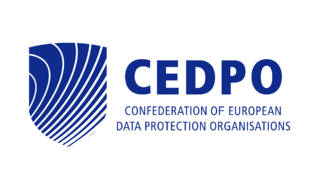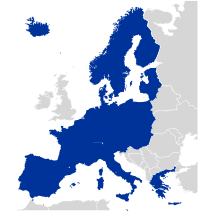Information privacy is the relationship between the collection and dissemination of data, technology, the public expectation of privacy, contextual information norms, and the legal and political issues surrounding them. It is also known as data privacy or data protection.

The Data Protection Directive, officially Directive 95/46/EC, enacted in October 1995, is a European Union directive which regulates the processing of personal data within the European Union (EU) and the free movement of such data. The Data Protection Directive is an important component of EU privacy and human rights law.

The Information Commissioner's Office (ICO) is a non-departmental public body which reports directly to the Parliament of the United Kingdom and is sponsored by the Department for Digital, Culture, Media and Sport (DCMS). It is the independent regulatory office dealing with the Data Protection Act 2018 and the General Data Protection Regulation, the Privacy and Electronic Communications Regulations 2003 across the UK; and the Freedom of Information Act 2000 and the Environmental Information Regulations 2004 in England, Wales and Northern Ireland and, to a limited extent, in Scotland.
Information privacy, data privacy or data protection laws provide a legal framework on how to obtain, use and store data of natural persons. The various laws around the world describe the rights of natural persons to control who is using its data. This includes usually the right to get details on which data is stored, for what purpose and to request the deletion in case the purpose is not given anymore.

The European Border and Coast Guard Agency, also known as Frontex, is an agency of the European Union headquartered in Warsaw, Poland, exercising in coordination with the border and coast guards of member states the border control of the European Schengen Area, a task within the area of freedom, security and justice domain.

Copernicus is the European Union's Earth observation programme coordinated and managed for the European Commission by the European Union Agency for the Space Programme in partnership with the European Space Agency (ESA), the EU Member States.

The Department of Peace Operations (DPO) is a department of the United Nations charged with the planning, preparation, management and direction of UN peacekeeping operations. Previously known as the Department for Peacekeeping Operations (DPKO), it was created on 1 January 2019 as part of a restructuring of the UN's peace and security apparatus. The DPO retains the core functions and responsibilities of its predecessor, with a greater emphasis on cohesion, integrating different resources and knowledge, and promoting human rights.
Industrial design rights in the European Union are provided at both the Union level by virtue of the Community design and at the national level under individual national laws.
The Chief Privacy Officer (CPO) is a senior level executive within a growing number of global corporations, public agencies and other organizations, responsible for managing risks related to information privacy laws and regulations. Variations on the role often carry titles such as "Privacy Officer," "Privacy Leader," and "Privacy Counsel." However, the role of CPO differs significantly from another similarly-titled role, the Data Protection Officer (DPO), a role mandated for some organizations under the GDPR, and the two roles should not be confused or conflated.
A direct public offering (DPO) or direct listing is a method by which a company can offer an investment opportunity directly to the public.

The European Data Protection Supervisor (EDPS) is an independent supervisory authority whose primary objective is to monitor and ensure that European institutions and bodies respect the right to privacy and data protection when they process personal data and develop new policies.

The General Data Protection Regulation (EU) (GDPR) is a regulation in EU law on data protection and privacy in the European Union (EU) and the European Economic Area (EEA). The GDPR is an important component of EU privacy law and of human rights law, in particular Article 8(1) of the Charter of Fundamental Rights of the European Union. It also addresses the transfer of personal data outside the EU and EEA areas. The GDPR's primary aim is to enhance individuals' control and rights over their personal data and to simplify the regulatory environment for international business. Superseding the Data Protection Directive 95/46/EC, the regulation contains provisions and requirements related to the processing of personal data of individuals who are located in the EEA, and applies to any enterprise—regardless of its location and the data subjects' citizenship or residence—that is processing the personal information of individuals inside the EEA.

The Confederation of European Data Protection Organisations (CEDPO) is a European umbrella organisation of data protection organisations.

The Data Protection Act, 2012 is legislation enacted by the Parliament of the Republic of Ghana to protect the privacy and personal data of individuals. It regulates the process personal information is acquired, kept, used or disclosed by data controllers and data processors by requiring compliance with certain data protection principles. Non compliance with provisions of the Act may attract either civil liability, or criminal sanctions, or both, depending on the nature of the infraction. The Act also establishes a Data Protection Commission, which is mandated to ensure compliance with its provisions, as well as maintain the Data Protection Register.
On 10 July 2017, a suicide bombing occurred at Bogra Chowk in Chaman, Chaman District, Balochistan, Pakistan. Four people were killed and 20 others were wounded. The deceased were two police officers, the bomber and a passerby. Tehreek-i-Taliban Pakistan claimed responsibility for the attack.
A data protection officer (DPO) ensures, in an independent manner, that an organization applies the laws protecting individuals' personal data. The designation, position and tasks of a DPO within an organization are described in Articles 37, 38 and 39 of the European Union (EU) General Data Protection Regulation (GDPR). Many other countries require the appointment of a DPO, and it is becoming more prevalent in privacy legislation.
The Campus Privacy Officer (CPO) is a position within a post-secondary university that ensures that student, faculty, and parent privacy is maintained. The CPO role was created because of growing privacy concerns across college campuses. The responsibilities of the CPO vary depending on the specific needs of the campus community. Their daily tasks may include drafting new privacy policies for their respective college campus, creating a curriculum that informs teachers and students about privacy, helping to investigate any privacy breaches within the university, and ensuring that the university is abiding by current state and federal privacy laws. CPOs are also responsible for connecting with student and faculty groups across the entire campus in order to understand the privacy concerns of the campus. The role of CPO is an expanding profession within the United States and other countries, such as Canada and South Africa. There are numerous organizations that exist to provide training for CPOs and support them.
In France, the Fichier des personnes décédées is a central register of persons who have died in the country since 1970. It is maintained by the national statistics bureau Institut national de la statistique et des études économiques (Insee). Since October 2019, the register has been accessible online free of charge and without registration.













